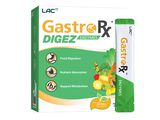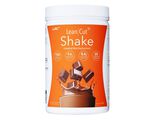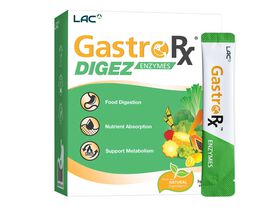Maintaining A Good Health While Fasting

Unlock the secrets to a healthier and comfortable fast this Ramadan.
During Ramadan, Muslims worldwide observe a holy month marked by fasting from dawn to dusk. This fasting, considered a significant act of worship, fosters self-discipline, empathy, and spiritual reflection.
Aside from its spiritual aspect, fasting may also provide several health benefits, such as weight control, blood sugar regulation, improvement in metabolic health[1] and longevity[2].
However, due to the sudden changes in eating habits, it’s not uncommon to experience digestive discomforts such as indigestion, acid reflux, bloating, and constipation. One is also more likely to experience fatigue and headache that results from dehydration, caffeine withdrawal, low blood sugar levels, changes in sleep cycle, or sleep deprivation[3].
Experiencing discomforts during Ramadan is not only uncomfortable but also potentially affects your daily activities, work performance and productivity.
In this article, we’ll share some tips to maintain good health while fasting, offering valuable insights and practical tips to ensure a comfortable and nourishing experience this Ramadan.
4 Tips for a Comfortable Fast This Ramadan
1. Include Fibre and Protein During Sahur
Sahur, the pre-dawn meal in Ramadan, is important for supplying energy and essential nutrients to sustain the body during the day-long fast.
Choosing nourishing foods for sahur ensures the body remains energised and nourished throughout the fasting day, influencing one's well-being. An inadequate meal can lead to fatigue, dehydration, hunger pangs, and digestive discomforts. While a wholesome meal with the right nutrients and energy can help keep the body nourished and energised.
As such, sahur should include the following foods:
● Fruits and vegetables
An excellent source of fibre, fruits and vegetables are essentials during fasting as they are slower to digest, therefore keeping us full for longer throughout the day. Adequate intake of fibre also help to reduce constipation[4], which is a common concern during fasting month.
It is recommended to eat a variety of fruits and vegetables as they provide vitamins, minerals and antioxidants that are important for energy production and overall good health. Aim for five or more servings of fruits and vegetables a day.
However, if you find it difficult to achieve this recommendation, taking a good multivitamin formula can supplement the nutrients that are not adequately gained from food alone, which can help ensure optimal body functioning during Ramadan.
● Protein Foods
Protein is excellent for sustaining energy during fasting as it takes longer to digest, gives better satiety and keeps us full for longer.
Consuming sufficient protein during sahur ensures the body stays energised and supplies essential amino acids for maintaining and repairing muscle tissue, protect against muscle loss during fasting[5].
Good quality protein foods include poultry, eggs, fish, beef, tempeh, tofu, and be
For some, getting enough protein during sahur is challenging due to time constraints in meal preparation, poorer appetite in the wee hours and other factors. To overcome this, you may consider a high-protein meal replacement product or incorporate a high quality protein powder into a smoothie blend.
Not only it is convenient and time-saving, but it also ensures adequate nutrient intake during sahur.
2. Avoid Overeating or Eating Too Quickly When Breaking Fast
When you’ve been fasting the whole day, it’s hard to resist the temptation to indulge quickly and excessively when breaking fast.
However, filling an empty stomach suddenly with a large meal or foods that are spicy, acidic or greasy can trigger reflux symptoms and indigestion. This is because during fasting, there’s changes in the stomach acid levels and digestive enzymes which can lead to reflux and other digestive discomforts[6].
Stomach acid and digestive enzymes are essential in breaking down food into absorbable nutrients for energy and health. Any imbalance in their levels not only leads to digestive discomfort but also affects nutrient absorption.
Start by breaking your fast with 2-3 dates for a natural energy boost, followed by smaller, healthier meals prepared through methods like stir-frying, steaming, grilling, baking, or opting for soupy dishes[7].
Eating and chewing foods slowly also allows the stomach to adjust gradually, helps with better digestion, and reduces common discomforts such as bloating and indigestion.
Incorporate foods rich in natural digestive enzymes like papaya, pineapple, bananas, mango, and fermented soy products (such as miso, soy sauce, and tempeh), or consider natural enzyme supplements during your meal to aid digestion and enhance nutrient absorption.
3. Stay Hydrated, Stay Refreshed
Abstaining from drinking fluids for 10-12 hours, especially in Malaysia's hot climate, increases dehydration risk. Yet, it's crucial to ensure adequate water intake daily to prevent discomforts like constipation, headaches, and fatigue, all too common during fasting[8].
Drink enough water during breaking fast and sahur to ensure adequate hydration. It could also be helpful to keep a water bottle by the bed for easy access to hydration throughout the night.
Be mindful of caffeinated or sugary drinks, foods too high in sugar or salt because they can induce thirst and urinate more frequently, making our body lose water faster.
Include plenty of fruit and vegetables with high water content such as watermelon, cucumber, lettuce, celery or tomatoes during your sahur and breaking fast. They are a good source of fiber and hydration, both are important factors to prevent constipation.
4. Keep Your Immune System In Check
Some studies suggest that short-term fasting may benefits immune system while prolonged fasting may lead to a reduction in certain immune cells production[9].
During the fasting month, factors such as nutritional deficiency, dehydration, changes in sleep patterns, and stress can affect our immune system.
Choosing the right foods rich in essential vitamins and nutrients during sahur and iftar can bolster our immunity and help combat illnesses[10]. Conversely, consuming the wrong foods can weaken the immune system, leaving us vulnerable to germs and viruses.
Vitamin C, found in citrus fruits, guava, strawberries, peppers, broccoli and green leafy vegetables, is one of the best known immune boosters. It is crucial to try and consume your recommended daily amount as our body can’t produce or store vitamin C.
In addition to including more fruits and vegetables during meal times, taking a vitamin C supplement can also help to ensure adequate intake of this vital nutrient.
Good Health This Ramadan
In conclusion, maintaining good health during Ramadan fasting is vital for a comfortable experience. Incorporate fibre-rich foods, high quality protein sources, and hydrating fruits and vegetables into your meals.
Practise mindful eating and stay hydrated by drinking plenty of water. Prioritise your immune system by consuming foods rich in essential vitamins and nutrients.
With these tips, you can enjoy a fulfilling and healthy fasting experience.
[1] https://www.ncbi.nlm.nih.gov/pmc/articles/PMC8839325/#:~:text=During%20prolonged%20periods%20of%20fasting,for%20many%20tissues%20especially%20brain
[2] https://www.healthline.com/nutrition/fasting-benefits
[3] https://www.hashmanis.com.pk/common-health-issues-during-ramadan/#:~:text=Common%20digestive%20system%20disorders%20reported,of%20fatty%2C%20sugary%2C%20oily%20or
[4] https://www.medicalnewstoday.com/articles/constipation-during-ramadan
[5] https://www.malaysiakini.com/announcement/614965
[6] https://www.gidoctor.com/feature-on-livestrong-com-acid-indigestion-when-youre-fasting-what-you-need-to-know/
[7] https://gleneagles.com.my/penang/articles/healthy-eating-during-ramadan
[8] https://www.hashmanis.com.pk/common-health-issues-during-ramadan/#:~:text=Common%20digestive%20system%20disorders%20reported,of%20fatty%2C%20sugary%2C%20oily%20or
[9] https://www.oatext.com/the-impact-of-ramadan-fasting-on-immune-system-function-during-covid-19-pandemic.php
[10] https://www.clevelandclinicabudhabi.ae/en/health-byte/infection-prevention-and-management/fasting-health-immunity-is-there-a-connection










